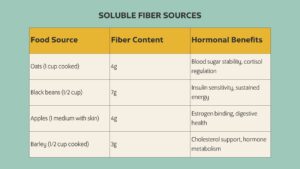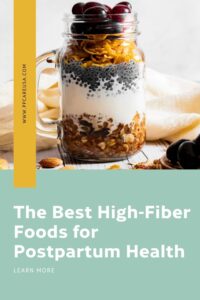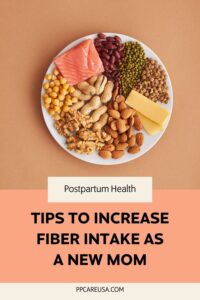Your morning bowl of oatmeal might be doing more than filling you up—it could be actively balancing your hormones throughout the day. While most people think of dietary fiber primarily for digestive health, emerging research reveals a powerful connection between fiber intake and hormonal regulation that extends far beyond the gut.
The relationship between fiber and hormones involves intricate biological pathways that influence everything from estrogen metabolism to blood sugar control. Understanding these mechanisms can transform how you approach both your healthy diet and hormonal wellness, particularly during crucial periods like the postpartum period when hormonal fluctuations are most pronounced. Postpartum nutrition plays a vital role in supporting recovery, hormone balance, and overall well-being for new moms.
This guide explores how dietary fiber intake directly impacts hormone production, metabolism, and elimination, offering evidence-based strategies to optimize your hormonal health through strategic food choices.
Introduction to Dietary Fiber
Dietary fiber is an essential part of a healthy diet, especially for new moms navigating the postpartum period. Including plenty of fiber-rich foods in your postpartum diet can make a significant difference in your overall well-being. A high fiber diet not only supports digestive health and helps prevent constipation—a common concern after childbirth—but also plays a role in supporting milk production and maintaining steady energy levels.
Whole grains like brown rice and whole wheat bread are excellent sources of dietary fiber and can be easily incorporated into meals and snacks. Leafy greens, fruits, and vegetables are also packed with fiber and other nutrients that are vital for a healthy postpartum diet. By choosing fiber rich foods such as wheat bread, berries, and legumes, new moms can help ensure they’re meeting their daily dietary fiber intake, which most experts recommend to be at least 25-30 grams per day (Source).
Making small changes, like swapping white bread for whole wheat bread or adding a serving of brown rice to your lunch, can help you gradually increase your fiber intake. These simple adjustments not only support a high fiber diet but also contribute to a healthy postpartum diet that benefits both you and your baby during the postpartum period.
The Importance of Hormonal Balance
Fluctuations in hormones can impact everything from your mood to your energy levels, making it essential to support your body with a healthy diet.
Incorporating foods rich in omega-3 fatty acids, such as fatty fish, can help promote hormonal balance and support brain health. Whole grains, fruits, and vegetables provide a steady source of energy and essential nutrients that help regulate blood sugar and insulin levels, both of which are key for hormonal stability. Staying hydrated, managing stress, and engaging in regular physical activity are also important strategies for supporting hormonal balance and mental health.
By focusing on a variety of whole foods—including whole grains, leafy greens, and colorful fruits and vegetables—new moms can help their bodies maintain a healthy hormonal environment. This not only supports milk supply and postpartum recovery but also contributes to overall well-being during this transformative time.
The Connection Between Fiber and Hormonal Health
Dietary fiber influences hormonal health through multiple sophisticated mechanisms that work synergistically to maintain balance. The two main types of dietary fiber—soluble fiber and insoluble fiber—each play distinct roles in hormone regulation, creating a comprehensive support system for endocrine function.
The gut microbiome serves as a critical intermediary in this relationship. When beneficial bacteria ferment non-digestible fibers in the colon, they produce short-chain fatty acids (SCFAs) like butyrate, acetate, and propionate. These powerful compounds have systemic effects that extend throughout the body, influencing immune function, inflammation levels, and crucially, hormone metabolism.
One of the most significant pathways involves hormone elimination. After hormones like estrogen are metabolized in the liver, they’re packaged into bile and sent to the intestines for excretion. However, certain gut bacteria can produce enzymes that reactivate these hormones, allowing them to be reabsorbed back into circulation—a process called enterohepatic recirculation.
High fiber intake fundamentally alters this process by reducing the activity of β-glucuronidase, the enzyme responsible for hormone reactivation. This means more hormones are eliminated through fecal excretion rather than being recycled back into the bloodstream, helping maintain optimal hormone levels naturally.
The hormones most significantly influenced by fiber intake include estrogen, insulin, cortisol, and thyroid hormones. Each responds to fiber through specific mechanisms that can be leveraged for targeted hormonal support. To maximize these hormonal benefits, it is important to choose healthy sources of fiber as part of a balanced diet.
How Fiber Regulates Estrogen Levels
Estrogen regulation represents one of the most well-documented effects of dietary fiber on hormonal health. This relationship is particularly relevant for women during reproductive years, the postpartum period, and menopause, when estrogen fluctuations can significantly impact overall wellbeing.
Soluble fiber acts like a sponge in the digestive tract, binding to estrogen molecules and preventing their reabsorption in the intestines. This binding action effectively reduces circulating estrogen levels, which can be beneficial for conditions associated with estrogen dominance, including certain types of breast cancer risk.
Research consistently shows that consuming 25-35 grams of dietary fiber daily provides significant benefits for estrogen balance.
The most effective foods for estrogen regulation include:
- Ground flaxseeds, which contain lignans—plant compounds that act as phytoestrogens and provide additional hormonal balancing effects.
- Cruciferous vegetables like broccoli, Brussels sprouts, and cauliflower offer both fiber content and compounds that support healthy estrogen metabolism.
- Whole grains, particularly those found in whole wheat bread and brown rice, provide steady fiber intake that supports consistent hormone elimination.
- Dairy products, including low fat dairy products and skim milk, are also nutritious options that provide calcium and vitamin D, supporting both maternal health and hormone balance.
For nursing moms and lactating women, maintaining balanced estrogen levels through adequate fiber intake and proper nutrition can support healthy milk production and the quality of breast milk, while promoting postpartum recovery. The gentle, natural approach of increasing fiber rich foods allows the body to regulate hormones without dramatic fluctuations that might affect milk supply.
Fiber’s Impact on Insulin and Blood Sugar Hormones
The relationship between fiber and blood sugar regulation creates a cascade of hormonal benefits that extend throughout the endocrine system. Soluble fiber forms gel-like substances in the digestive system that significantly slow glucose absorption, leading to more stable blood sugar levels and improved insulin sensitivity.
This mechanism is particularly important for preventing insulin resistance, a condition that affects multiple hormonal pathways and can contribute to weight gain, mood fluctuations, and increased cortisol production. For postpartum women, monitoring caloric intake alongside fiber consumption is important, as energy needs may change during recovery and breastfeeding.
Foods high in soluble fiber—including oats, beans, apples, and psyllium husk—create a sustained release of glucose that prevents the dramatic spikes and crashes associated with refined grains and processed foods.
The benefits extend beyond immediate blood sugar control. Stable glucose levels help maintain balanced cortisol production, as the stress hormone system doesn’t need to compensate for dramatic energy fluctuations. This is especially crucial during the postpartum period when energy demands are high and hormonal stability supports both mental health and physical recovery.
For new moms managing postpartum weight and seeking healthy weight maintenance, the insulin-sensitizing effects of fiber can support natural weight loss without compromising milk production or energy levels. A healthy approach to lose weight and losing weight postpartum involves balanced nutrition, patience, and supporting hormonal balance, rather than aiming for rapid results.
Unlike restrictive diets that can disrupt hormonal balance, increasing fiber intake through whole foods provides sustainable support for metabolic health. Simply aim to add more fiber to every meal and you’ll be in great shape!
Cortisol and Stress Hormone Regulation Through Fiber
Did you know your gut and brain are constantly talking to each other? And what you eat—especially fiber—plays a huge role in that conversation.
When you eat enough fiber from foods like fruits, veggies, and whole grains, you feed the good bacteria in your gut. In return, those bacteria help your body make the building blocks for important brain chemicals—like serotonin—that keep your mood more stable and your stress levels in check.
Eating fiber throughout the day (not just in one big meal) helps your body stay balanced. It keeps your blood sugar more stable, supports your energy, and can prevent those late-afternoon crashes or mood swings that leave you feeling anxious or overwhelmed.
If you’re dealing with postpartum anxiety or depression, this connection is especially powerful. The nutrients produced in your gut can help support hormone balance, brain health, and your emotional well-being.
It’s not just about digestion—fiber helps you feel more like you again.
For mamas dealing with postpartum depression or anxiety, the mood-stabilizing effects of adequate fiber intake can provide valuable support alongside other interventions. The B vitamins and other nutrients produced by fiber-fed gut bacteria contribute to neurotransmitter synthesis, supporting both mental health and hormonal balance.
Thyroid Function and Fiber Considerations
The relationship between fiber and thyroid hormones requires careful balance, particularly for individuals taking thyroid medications or managing thyroid conditions.
Moderate dietary fiber intake—within the recommended 25-35 grams daily—can actually support thyroid function by promoting the conversion of inactive thyroxine (T4) to active triiodothyronine (T3). This conversion process requires various micronutrients including selenium, zinc, and iron, which are better absorbed when the digestive system is functioning optimally through adequate fiber intake. Taking postpartum vitamins can help ensure adequate intake of these key nutrients, supporting both thyroid health and overall postpartum recovery.
Individuals with hypothyroidism should be particularly mindful of fiber timing and may benefit from consuming their highest fiber meals several hours after taking thyroid medication. Those with hyperthyroidism may find that the stabilizing effects of fiber on digestion and nutrient absorption provide valuable support for overall hormonal balance.
The key lies in working with healthcare providers to develop individualized approaches that maximize both medication effectiveness and dietary fiber benefits. In certain situations, such as during disease management or when specific medications require it, less fiber may be recommended to improve symptom control or medication absorption. Regular monitoring of thyroid function tests can help determine whether fiber intake timing needs adjustment.
Supporting Postpartum Health with Fiber
A high fiber diet is a cornerstone of postpartum health, offering a range of benefits that support new moms as they recover and care for their babies. Dietary fiber helps promote regular digestion, prevents constipation, and supports healthy blood sugar levels—all of which are especially important during the postpartum period.
Soluble fiber, found in foods like oats and barley, can help lower cholesterol and stabilize blood sugar, providing sustained energy throughout the day. Insoluble fiber, present in whole wheat bread, leafy greens, and many vegetables, adds bulk to the stool and keeps the digestive system running smoothly. By including a mix of both types of fiber, new moms can enjoy the full spectrum of benefits that a high fiber diet offers.
Managing Caffeine and Fiber for Hormonal Balance
Let’s be real—many of us lean on caffeine to get through those sleepless nights and early mornings. And while a little coffee can be totally fine (less than 300mg a day is considered safe), too much can mess with your hormones and may even impact your milk supply. It’s worth keeping an eye on how much you’re getting from coffee, tea, sodas, or energy drinks—especially when you’re already running on fumes.
Now for the good news: fiber is your friend. It helps keep your digestion on track, supports steady energy, and plays a key role in hormone balance. Simple swaps—like choosing whole grains instead of processed carbs, adding greens to your meals, or tossing fruit into your snacks—can make a big difference.
If you’re postpartum, aim for 25–30 grams of fiber per day and keep caffeine moderate. Focusing on real, whole foods not only fuels your recovery but helps you feel more like yourself again.
Best High-Fiber Foods for Postpartum
Strategic selection of fiber sources maximizes hormonal benefits while providing comprehensive nutritional support. The most effective approach combines both soluble and insoluble fiber sources to address different aspects of hormone regulation. Including dairy products, such as low fat dairy products and skim milk, as part of a balanced selection of high-fiber and nutrient-rich foods is especially important for postpartum women to support calcium, vitamin D, and protein needs.
- Whole grains (oats, brown rice, quinoa)
- Legumes (lentils, chickpeas, black beans)
- Fruits (apples, pears, berries)
- Vegetables (broccoli, carrots, leafy greens)
- Nuts and seeds (chia seeds, flaxseeds, almonds)
- Dairy products (low fat dairy products, skim milk)
- Postpartum foods: high-fiber options like whole grains, legumes, and leafy greens that support recovery and lactation
Soluble Fiber Champions

Insoluble Fiber Sources
- Whole wheat pasta: Provides sustained energy and supports healthy weight management
- Nuts and seeds: Offer healthy fats alongside fiber for comprehensive hormonal support
- Leafy greens: Deliver fiber plus folate and other nutrients crucial for hormone synthesis
- Cauliflower and broccoli: Combine fiber with compounds that support estrogen metabolism
Hormone-Specific Superfoods
Ground flaxseed stands out as particularly beneficial, providing both fiber and lignans that act as phytoestrogens. One to two tablespoons daily can significantly impact estrogen balance. Chia seeds offer similar benefits with the added advantage of omega-3 fatty acids that support overall hormonal health.
Citrus fruits provide vitamin C alongside fiber, supporting adrenal function and cortisol regulation. Berries combine antioxidants with fiber to support overall endocrine health while satisfying sweet cravings naturally.
For optimal results, aim for:
- Whole grains: At least 3 servings daily, choosing options like brown rice, whole grain bread, and wild rice
- Legumes: 1-2 servings daily from sources like beans, lentils, and peas
- Fruits and vegetables: Minimum 5 servings daily, emphasizing variety and color
- Nuts and seeds: 1-2 servings daily for healthy fats and additional fiber
Practical Tips for New Moms Wanting to Increase Fiber Intake
If you’re a new mama wanting to support your hormones and digestion, fiber can be a game-changer—but only if you ease into it.
Start slow by adding about 5 grams of fiber per week. That gives your gut time to adjust and helps you avoid the gas and bloating that can happen when you go from zero to chia-seed-queen overnight.
Don’t forget the water!
As you increase fiber, it’s so important to drink plenty of fluids—aim for at least 8–10 cups a day. This helps fiber do its job and keeps things moving (a must for tired, constipated postpartum bodies).
Pair fiber with healthy fats and protein.
Here’s the magic formula: when you combine fiber with fat and protein, you not only stay fuller longer, but you also support steadier blood sugar and better hormone balance. A few easy ideas:
- Breakfast: Oatmeal with berries, flaxseeds, and almond butter
- Lunch: Lentil or chickpea salad with avocado and olive oil
- Dinner: Grilled salmon, roasted veggies, and quinoa
Spread it out.
Instead of loading up on fiber in one meal, spread it across your day. This keeps your energy more stable and helps prevent those 3 p.m. crashes. If you’re on thyroid medication, try to eat your highest fiber meals a few hours after taking your meds, so you don’t interfere with absorption.
Check nutrition labels.
When grocery shopping, look for foods with at least 3g of fiber per serving—but lean on whole foods like fruits, veggies, beans, and whole grains, not just packaged items that say “added fiber.” Real food will always give you more hormonal bang for your buck.
Need a shortcut? We’ve curated fiber-rich supplements and snacks in our supplement shop that make it super easy to meet your goals—even when your baby won’t let you put them down.
When to Consult Healthcare Providers
Professional guidance becomes essential when implementing significant dietary changes, particularly for individuals with existing hormonal imbalances, thyroid conditions, or those taking medications that may interact with increased fiber intake.
Specific situations requiring medical consultation include:
- Current hormone replacement therapy or thyroid medication use
- History of digestive disorders like IBS or IBD
- Significant changes in menstrual cycles or menopausal symptoms
- Persistent digestive discomfort despite gradual fiber increases
- Concerns about postpartum depression or anxiety during dietary changes
It is also important to follow public health and disease control guidelines regarding alcohol consumption and other dietary risks during the postpartum period to help prevent health risks for both mother and baby.
Healthcare providers may recommend monitoring specific hormone levels through blood tests, including estrogen, insulin, TSH, free T4, free T3, and cortisol levels. These measurements can help track the effectiveness of dietary interventions and identify any need for adjustments.
For new moms, consulting with both healthcare providers and registered dietitians can ensure that increased fiber intake supports both personal health goals and optimal milk production. The postpartum period represents a unique time when hormonal needs are elevated, and individualized approaches yield the best results.
Keeping a food and symptom diary can provide valuable information for healthcare consultations, tracking both daily fiber intake and any changes in energy levels, mood, digestive function, or other symptoms. This information helps providers make informed recommendations about dietary modifications and timing.
Transforming Your Hormonal Health Through Fiber
You don’t need a complete diet overhaul to support your hormones—just a few fiber-filled tweaks. Start small by adding one high-fiber food to each meal (think: oats, beans, flaxseeds, leafy greens). Over time, these simple choices can help balance your energy, mood, digestion, and overall well-being.
Stay hydrated, listen to your body, and remember—you deserve to feel good in your body again. Let fiber be one of the tools that gently gets you there.
Pin This for Later:



Postnatal Depletion
Meet the Team
Our Services
Supplements
A virtual healthcare clinic that helps postpartum mamas recover from postnatal depletion syndrome with a holistic approach.


Get in touch